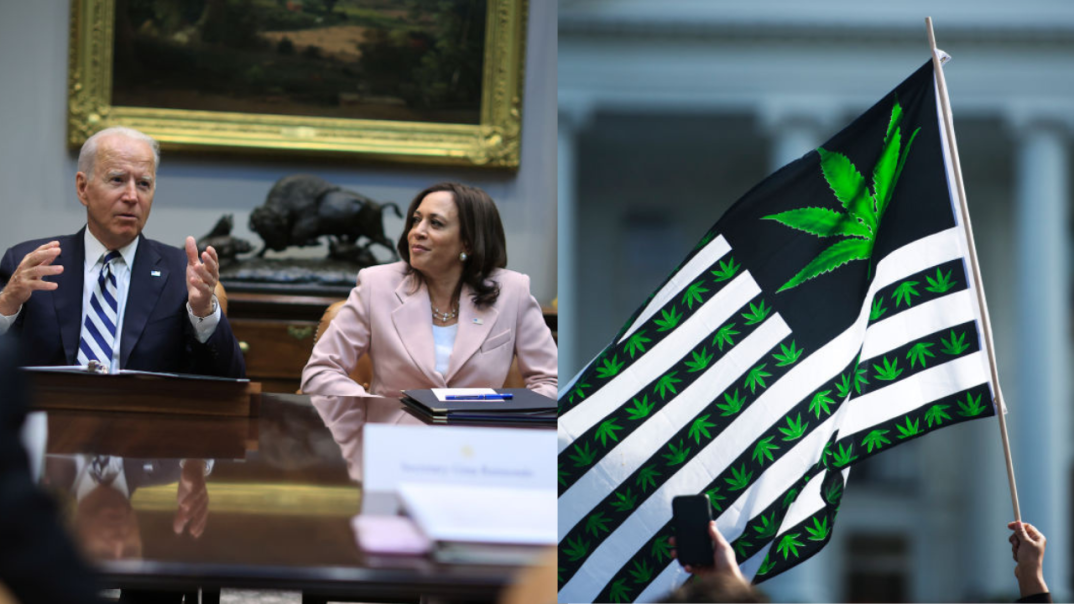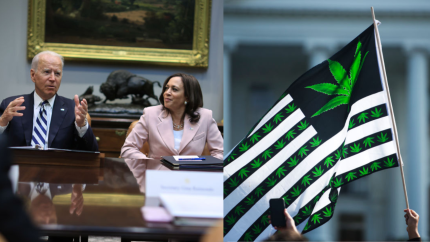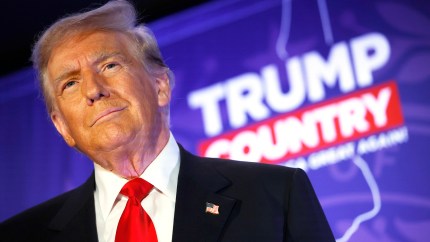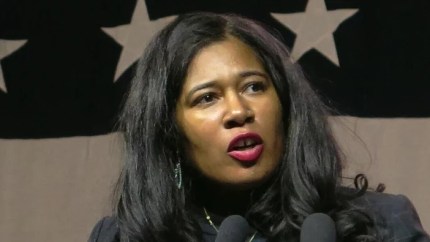For 4/20, advocates call on Biden and Harris to go further on marijuana policy
“Folks are wanting to see the Biden administration, at the very least in its rhetoric, keep up the same energy that it did in 2020,” Cat Packer, director of drug markets and legal regulation at Drug Policy Alliance, told theGrio.

As millions of people around the globe celebrate the cannabis holiday known as 4/20, advocates are calling on President Joe Biden and Vice President Kamala Harris to do more on the federal level to redress the legal and societal harms of marijuana prohibition, and its disproportionate impact on Black and brown communities.
“It is a moral imperative that marijuana be decriminalized and descheduled,” read a letter addressed to Biden and Harris from the Marijuana Justice Coalition, which is comprised of several advocacy groups including the Drug Policy Alliance, Southern Poverty Law Center and Center for American Progress, among others.
The coalition notes that marijuana criminalization has been particularly “devastating” for Black and brown Americans. Black people are four times more likely to be arrested for marijuana possession than white people, despite similar rates of usage. Additionally, the letter points out that Blacks and Latinos make up over 85% of those sentenced for federal marijuana charges.
Though the groups acknowledged the White House’s “initial steps” toward reforming federal marijuana policy, they are calling on the administration to live up to their 2020 campaign promise to decriminalize marijuana on the federal level.
“Folks are wanting to see the Biden administration, at the very least in its rhetoric, keep up the same energy that it did in 2020,” Cat Packer, director of drug markets and legal regulation at Drug Policy Alliance, told theGrio. “It really feels like we’re backtracking in this moment when we can’t even get President Biden to say he supports decriminalization. The thing that would be necessary for him to fulfill his promise.”

As a candidate, Biden pledged to decriminalize marijuana and “automatically expunge” prior marijuana convictions. Since taking office, he signed a presidential proclamation in October 2022 issuing pardons for those convicted of simple possession of marijuana. In December 2023, the president expanded his proclamation to include additional offenses like attempted possession and simple use of marijuana.
Biden also called on the Department of Health and Human Services to review the status of marijuana under the Controlled Substance Act, which ultimately recommended that the drug be moved from Schedule 1, which currently includes drugs like heroin and LSD, to Schedule 3, which would place it in the same category as anabolic steroids and codeine. The recommendation from HHS is currently under independent review at the Department of Justice, where the Drug Enforcement Agency will decide on whether to follow through on the HHS recommendation. The process could take months.
During his State of the Union address in March, Biden mentioned his cabinet’s review of the federal classification of marijuana and his move to expunge “thousands of convictions for the mere possession” of the drug.
“No one should be jailed for simply using or have it on their record,” the president declared.
Days later, Harris convened stakeholders during a roundtable on marijuana reform, where she emphatically echoed Biden’s sentiment.
“Nobody should have to go to jail for smoking weed,” Harris said.
That increased rhetoric on marijuana reform and whispers in advocacy circles that further commutations will be announced by the White House led drug policy advocates to publicly push the administration to rethink its approach.
“The only way to actually fulfill that campaign promise is to decriminalize cannabis use and deschedule,” said Packer, who said rescheduling would “fall short of those promises.”

She added, “It would be extremely significant if President Biden and Vice President Harris were to even just voice support for descheduling and decriminalization.”
Ultimately, the Biden-Harris administration appears to be making a political calculation by not going further on marijuana reform, Packer said. The distinguished cannabis policy practitioner said she thinks it is a missed opportunity for the White House, particularly considering Biden has signed two executive orders on racial equity that required all federal agencies to assess how federal policies and programs impact Black and underserved communities.
Packer said what she and other advocates have noticed is that marijuana reform is missing from the administration’s racial equity framework.
“That is probably a calculation that’s based around some of the larger conversations that are happening in the country around folks trying to dismantle diversity, equity, and inclusion initiatives,” she said. “I think that there’s kind of this desire to position to the right a little bit and to take a conservative position on some of these issues.”
However, Packer noted that decriminalizing marijuana is now a bipartisan issue and that polls show most Americans support legalization for adult use.
Recommended Stories
When asked about the letter addressed by advocates to Biden on Friday, White House Press Secretary Karine Jean-Pierre told theGrio that the president “doesn’t believe that anyone should be in jail or be prosecuted just for using or possessing marijuana.”
“HHS concluded their independent review, which was guided by evidence, by science, which is … what we believe here in this administration. And now the scheduling review is now with the Department of Justice,” the Biden spokesperson said.
Jean-Pierre declined to confirm whether additional pardons from the White House are imminent.
As the nation anticipates the rescheduling of marijuana at the DOJ, advocates are also calling on the Biden-Harris White House to publicly push Congress to act on decriminalizing and descheduling marijuana through legislation. They also want to see the administration take “discretionary actions” like creating guidance for federal agencies to mitigate the policy harms under marijuana prohibition, whether Schedule 1 or Schedule 3.
“What does it look like for [Biden] to direct [Department of Housing and Urban Development] to issue guidance about what it would mean for even just medical patients,” Packer said as an example. “People who are using cannabis medically and legally as a part of the estate programs, so that they aren’t being kicked out of housing and families being disrupted?”
Packer said the concern she and advocates have about the looming rescheduling of marijuana to Schedule 3 is that leaders will act as if “this was the thing that’s going to be a solution” when it is not.
“Folks in Congress and at the federal level will spend the next 10 to 20 years trying to implement Schedule 3,” Packer said. “There won’t be enough air in the room to talk about all of the other issues that comprise cannabis policy and all of the stakeholders that continue to be impacted by prohibition.”
Never miss a beat: Get our daily stories straight to your inbox with theGrio’s newsletter.








